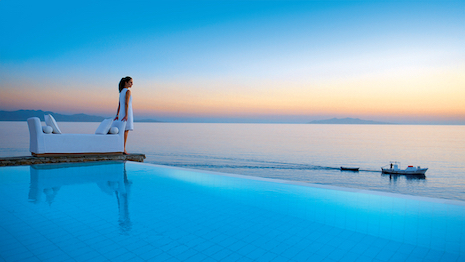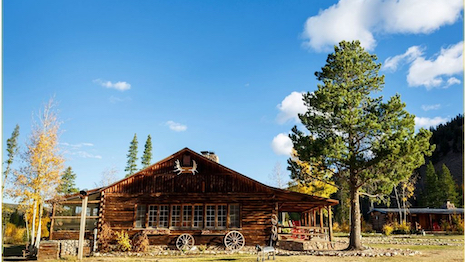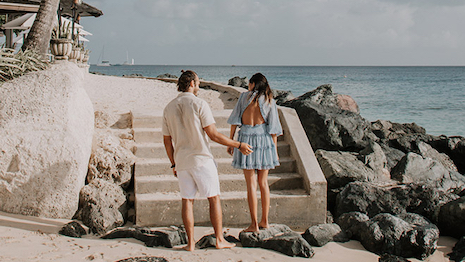 Petasos Beach Resort in Mykonos, Greece. Image courtesy of Small Luxury Hotels of the World
Petasos Beach Resort in Mykonos, Greece. Image courtesy of Small Luxury Hotels of the World
NEW YORK – After reaching new heights in 2019, the travel industry has been among the hardest by the coronavirus pandemic.
Luxury travel experts speaking at the Future of Luxury eConference on Sept. 23 shared their predictions for how the hospitality industry will recover after months of shutdowns brought leisure travel to a halt. With government regulations and closed borders still in place, the industry has a longer road ahead than other sectors.
“We're all going to return to that 2019 level,” said Jacqui Gifford, editor in chief at Travel + Leisure, New York. “It's going to be a little bit of a slower recovery, but our understanding in travel has really stepped up.
“We’re of understanding now how to live with the virus, how to adapt and come up with new health and safety protocols,” she said. “I think we are seeing some really interesting things right now.”
Future of Luxury eConference was produced by Luxury Daily
Travel bucket lists
During the pandemic, travelers’ mindsets have shifted in favor of quick planning and domestic trips to be able to travel.
“The booking window has become incredibly short,” Ms. Gifford said. “A lot of times people will just see an opportunity to go away for a weekend, and they'll book, then two days later get out on the road.
“The other side of that is that there's a lot of long term dreaming going on,” she said. “People do believe that travel will return when there is a vaccine or some sort of clarity really around protocols on a global level.”
Until travelers can take their dream trips, many are opting to rediscover their local communities or take nature-based vacations. Remote destinations in Colorado and Montana have been popular.
 Remote hotels that allow travelers to enjoy nature are in demand. Image credit: Small Luxury Hotels
Remote hotels that allow travelers to enjoy nature are in demand. Image credit: Small Luxury Hotels
Marriott’s loyalty program Bonvoy is teaming with the National Park Foundation (NPF), the nonprofit partner of the National Park Service, to encourage travelers to explore national parks across the United States.
More than 400 Marriott properties are located near national parks, making this a natural partnership. Most Americans also live within 100 miles of a national park, making the destinations more easily accessible by private vehicles as travelers avoid commercial airlines (see story).
“The fortunate thing is people are still traveling,” said Kenan Simmons, vice president of the Americas at Small Luxury Hotels of the World. “They're not traveling in the numbers that that we obviously would like, but with leisure travel this summer, we saw a good uptake.”
Mr. Simmons noted that SLH has seen increase demand for “buyouts,” with guests interested in booking entire properties — which are smaller than those of other hospitality brands — for stays with extended families and friends. Long-term inquiries are also up, as more people are working from home with children participating in virtual learning.
Those who have an appetite for international travel have been able to visit the Caribbean and Mexico. Ms. Gifford and Mr. Simmons have also seen interest in Europe rebound.
 The Caribbean remains accessible to Americans looking to travel abroad. Image credit: Small Luxury Hotels of the World
The Caribbean remains accessible to Americans looking to travel abroad. Image credit: Small Luxury Hotels of the World
“Americans, in particular, are desperate to go to Europe — they love Europe,” Ms. Gifford said. “It feels comfortable for Americans once we can get some sort of clarity on when borders are going to reopen there.
“If Europe can have a successful holiday season next year, I think that really big win for the travel industry,” she said.
Returning to travel
As consumers return to leisure travel, they remain interested in experiences and not just amenities and safety measures. Mr. Simmons explained guests want to ensure that dining and spa services are available before asking about any additional regulations.
To encourage travelers, tourism bureaus and hospitality groups should create emotional, rather than cognitive, connections with consumers, according to a recent study from the United Kingdom.
Researchers argue that emotional attachment is essential for the hospitality industry to recover since it can increase travelers’ desires to visit specific sites after the pandemic ends (see story).
For instance, the city of Beverly Hills, CA is welcoming back visitors with a new campaign focusing on all of its unique offerings while highlighting extensive efforts to keep visitors safe.
With its “Something to Feel Good About” initiative, Beverly Hills Conference & Visitors Bureau is calling attention to its world-class service and new safety standards, as well as its upscale shopping and dining options. BHCVB is also partnering with luxury hotels in the city to offer special packages to further entice travelers (see story).
“It’s not all doom and gloom,” Mr. Simmons said. “I do think it's going to be a slow recovery.
“But if you look where we were in April to where we are now, we’re miles ahead of that,” he said. “And I think that trend will definitely can continue as people who have the means want to travel, they want to experience things they want to explore.”
